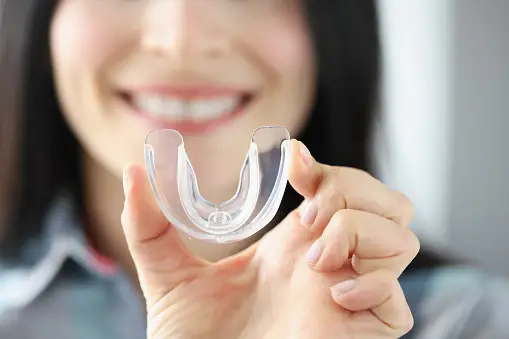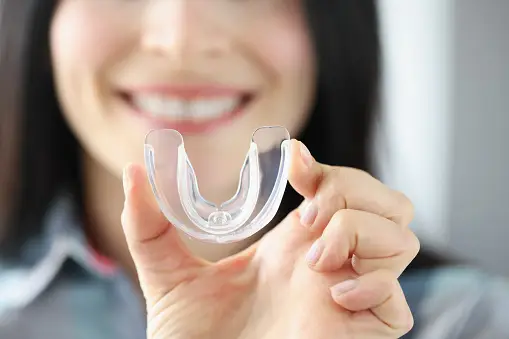
22 Mar What Is a Night Guard?
What Is a Dental Night Guard?

Teeth grinding and jaw clenching are both common conditions, and while they seem harmless enough, they can result in headaches and tooth damage. That’s why many dentists recommend their patients get and wear night guards.
What is a night guard? A night guard is a protective device worn in the mouth to prevent the wearer from grinding their teeth and/or clenching their jaws. As implied in the name, night guards are usually worn during sleep.
Night guards come in a variety of designs and can have benefits in addition to preventing tooth grinding and jaw clenching.
Dental Night Guards

A dental night guard is a protective device that is worn in the mouth while sleeping. It is designed to prevent teeth grinding and clenching, also known as bruxism. Bruxism is a common condition that affects both children and adults and can result in tooth damage, headaches, and jaw pain.
A dental night guard is typically made from a flexible plastic material that is molded to fit the shape of the wearer’s teeth. It is designed to cushion the teeth and absorb the force of grinding and clenching. Night guards can be custom-made by a dentist or purchased over the counter at a pharmacy.
Custom-made night guards are made from a mold of the patient’s teeth and are specifically tailored to fit their unique dental anatomy. They offer the most comfortable and effective protection against bruxism, but they are more difficult to obtain and often more expensive. To obtain a custom-made night guard, you’ll have to visit a dentist, who will take impressions of the teeth and send them to a dental laboratory to create the guard.
Over-the-counter night guards are available in a variety of shapes and sizes and can be purchased without a prescription. While they are less expensive than custom-made guards, they may not fit as well or offer the same level of protection.
Night guards are typically worn at night while sleeping, but they can also be worn during the day if necessary. They are designed to be worn for an extended period of time and can last anywhere from several months to several years depending on the type of guard and the frequency of use.
While night guards are primarily used to protect teeth from the effects of bruxism, they can also help alleviate other symptoms associated with the condition. For example, wearing a night guard can reduce jaw pain and headaches caused by clenching and grinding.
In addition to preventing tooth damage and reducing pain, wearing a night guard can also improve sleep quality. Bruxism can cause disrupted sleep patterns and lead to daytime fatigue, and wearing a night guard can help reduce these symptoms.
How To Know When You Might Need a Night Guard

If you are experiencing symptoms such as jaw pain, headaches, or tooth sensitivity, you may be a candidate for a night guard. Bruxism, or teeth grinding and clenching, is a common condition that often occurs while sleeping and can lead to these symptoms.
Other signs that you may need a night guard include worn, chipped, or cracked teeth, as well as receding gums and loose teeth. If you have been diagnosed with bruxism by your dentist, a night guard may be recommended as a treatment option.
It is also important to consider lifestyle factors that may contribute to bruxism. Stress and anxiety can lead to teeth grinding and clenching, as can certain medications and medical conditions. If you are experiencing any of these factors, a night guard may be a useful tool in managing your symptoms.
If you suspect that you may need a night guard, it is important to speak with your dentist. They can assess your dental health and recommend the best course of treatment for your specific needs.
How long do night guards typically last and when should they be replaced? Night guards typically last from several months to several years, depending on the frequency of use and the material they are made from. It’s usually a good idea to replace a night guard when it becomes worn or damaged, or if it no longer fits properly.
Are there any side effects or discomfort associated with wearing a night guard? Some people may experience mild discomfort or soreness when first wearing a night guard, but this usually subsides after a few nights. Other potential side effects include dry mouth, excessive saliva, and a slight lisp while speaking. However, most people adjust to wearing a night guard fairly quickly and experience few, if any, side effects.


Sorry, the comment form is closed at this time.